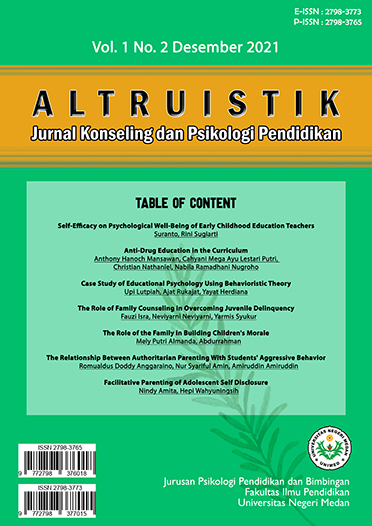The Role of the Family in Building Children's Morale
DOI:
https://doi.org/10.24114/altruistik.v1i2.27211Keywords:
Family, Morals of children, Family CounselingAbstract
The motivation of this paper is to describe the role of the family in building morals through an exploration type by looking at what methods families use in educating children to build children's morals through family counseling analysis. Furthermore, the role of the family in building the morale of children is analyzed through family counseling as a guide to the importance of building harmony with individuals in the family, especially with children. This research is considered important because lately the lack of morality in children is caused by various factors that occur at this time. It is not only caused by the education of parents, but also due to environmental influences and the continuous development of the times. This research uses the library research method with a theoretical approach. The results of this description are obtained from various existing studies, and literature. The scope of methods that have been used by families in building children's morality is more striking, namely the Islamic religious education method, the method of communication, and the method of moral education.References
™Ulwan, A. N. (2012). Aulad Tarbiyatul Islam (Pendidikan Anak Dalam Islam). Insan Kamil.
Abdurrahman, A. (2019). Fungsi dan Peran Konseling Islam Dalam Pendidikan. Islamic Counseling: Jurnal Bimbingan Konseling Islam, 3(1), 33. https://doi.org/10.29240/jbk.v3i1.799
Handayani, M. (2016). Peran Komunikasi Antarpribadi Dalam Keluarga Untuk the Role of Interpersonal Communication in Family To. JIV-Jurnal Ilmiah Visi, 11(1), 57“64.
Khaironi, M. (2017). Pendidikan Moral Pada Anak Usia Dini. Jurnal Golden Age, 1(1), 1“16. https://doi.org/10.29408/goldenage.v1i01.479
Laela, F. N. (2017). Bimbingan Konseling Keluarga Dan Remaja. UIN Sunan Ampel Press.
Nurjanah, S. (2018). The Development Of Religious And Moral Values. Paramurobi: Jurnal Pendidikan Agama Islam, 1(1), 43“59. https://doi.org/10.32699/paramurobi.v1i1.177
Putra, A., Ritonga, M. H., Nurhamidin, B., Yusuf, M., & Nikmah, F. (2020). Ragam Studi Fungsi Keluarga Dalam Membentuk Moral Anak (Analisis Melalui Konseling Keluarga). Jurnal Al-Irsyad: Jurnal Bimbingan Konseling Islam, 2(2), 215“230.
Safitri, L. N., & ˜Aziz, H. (2019). Pengembangan Nilai Agama dan Moral Melalui Metode Bercerita pada Anak. Golden Age: Jurnal Ilmiah Tumbuh Kembang Anak Usia Dini, 4(1), 85“96. https://doi.org/10.14421/jga.2019.41-08
Setyowati, Y. (2013). Pola Komunikasi Keluarga dan Perkembangan Emosi Anak (Studi Kasus Penerapan Pola Komunikasi Keluarga dan Pengaruhnya terhadap Perkembangan Emosi Anak pada Keluarga Jawa). Jurnal Ilmu Komunikasi, 2(1), 67“78. https://doi.org/10.24002/jik.v2i1.253
Siregar, R. (2015). Urgensi Konseling Keluarga Dalam Menciptkan Keluarga Sakinah. Hikmah, 2(1), 77“91.
Taubah, M. (2016). Pendidikan Anak Dalam Keluarga Perspektif Islam. Jurnal Pendidikan Agama Islam, 3(1), 109“136.
Downloads
Published
Issue
Section
License
Copyright (c) 2021 Mely Putri Almanda, Abdurrahman

This work is licensed under a Creative Commons Attribution-ShareAlike 4.0 International License.
Authors published in this journal agree to the following terms:
- The copyright of each article is retained by the author (s).
- The author grants the journal the first publication rights with the work simultaneously licensed under the Creative Commons Attribution License, allowing others to share the work with an acknowledgment of authorship and the initial publication in this journal.
- Authors may enter into separate additional contractual agreements for the non-exclusive distribution of published journal versions of the work (for example, posting them to institutional repositories or publishing them in a book), with acknowledgment of their initial publication in this journal.
- Authors are permitted and encouraged to post their work online (For example in the Institutional Repository or on their website) before and during the submission process, as this can lead to productive exchanges, as well as earlier and larger citations of published work.
- Articles and all related material published are distributed under a Creative Commons Attribution-ShareAlike 4.0 International License.
All writing in this journal is the sole responsibility of the author. Altruistik provides open access to anyone so that the information and findings in these articles are useful for everyone. Altruistik can be accessed and downloaded for free, free of charge, following the creative commons license.
License
ALTRUISTIK : Jurnal Konseling dan Psikologi Pendidikan is licensed under a Creative Commons Attribution-ShareAlike 4.0 International License.
You are free to :
Share — copy and redistribute the material in any medium or format
Adapt — remix, transform, and build upon the material for any purpose, even commercially
Under the following terms :
Attribution — You must give appropriate credit, provide a link to the license, and indicate if changes were made. You may do so in any reasonable manner, but not in any way that suggests the licensor endorses you or your use.
ShareAlike — If you remix, transform, or build upon the material, you must distribute your contributions under the same license as the original
No additional restrictions — You may not apply legal terms or technological measures that legally restrict others from doing anything the license permits


